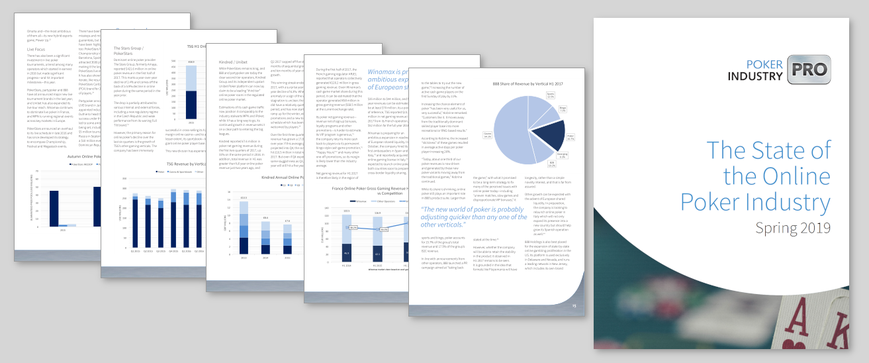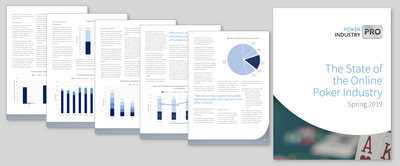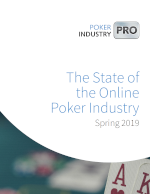

With the global leaders in the online poker industry reporting more than $1 billion in revenue from the game in 2018, online poker is certainly big business.
By comparing the financial data from some of the top online poker companies in the world—both to each other and to the performance of the companies in recent years—we can gain additional insight into the overall health of the global online poker industry.
It is important to note that not all of the leading online poker operators are a part of a publicly traded company, but many of the industry’s most recognizable brands are owned by larger igaming companies whose shares are traded on stock markets around the world. These famous brands include PokerStars, partypoker and 888poker.
Expert analysis of the global online poker industry as detailed in the upcoming Poker Industry PRO report, The State of the Online Poker Industry Spring 2019, provides an in-depth look at the financial figures reported by the top online gaming companies as they relate to online poker and other igaming verticals.
 Get Your Copy »
Get Your Copy »
- Trends expected to drive the industry in 2019
- Operator financial data and analysis
- Regulated market developments and outlook
- Significant events to follow in the coming year
- Knowledge and expertise backed by best-in-class Data platform
- Special features and interviews with the some of the industry’s most important decision-makers
In addition to the publicly reported figures, the report provides projected poker numbers to bridge the gap in public reporting for those companies that do not breakout poker or that are privately owned. The report also details recent product developments of each of the market leaders as well as their position relative to the regulated online gaming markets around the world to help provide a more comprehensive snapshot of the industry.
The following passages are excerpts from the report which is slated to be released in early April to subscribers of Poker Industry PRO.
The Stars Group / PokerStars
In its “international” business segment, which includes PokerStars and associated brands but excludes its new acquisitions (including Sky Poker), The Stars Group grew online poker by a single percentage point in 2018 to $886.6 million. While slight, it marks the second year of growth and is in line with the 2015 high.
The full year results mask a tale of two halves. In Q1, the company reported 12.4% growth; in Q2 it was 6.9%. Combined, it made for the best half-year on record. While a large part of the growth was down to favorable currency fluctuations, underlying growth was still 2.2% and 3.8%, respectively.
However, the second half of the year undid almost all the gains enjoyed in the first. Poker revenue declined 3.9% in Q3 (though reportedly +0.3% in constant currency) and 10% in Q4 (-4.4% in constant currency).
GVC / partypoker
By all major metrics, 2018 was the year that GVC could confidently state that it was the world’s second largest provider of online poker. By estimates of revenue, cash game traffic, online tournaments, and live poker presence, it left the competition—namely, 888—in the dust; at times, it punched well above its weight.
Online poker revenue for 2018 grew 40% in 2018, with 43% growth reported in the last two quarters of the year. This is estimated at €137 million in annual net gaming revenue, based on extrapolating executive comments of relative performance from historic absolute revenue figures.
This growth comes thanks to sustained investment into online poker to rebuild its brand which has attracted players to the platform from the competition.
888 Holdings / 888poker
After 888 reported very disappointing results in online poker for the first half of 2018—down 28% year-over-year, its worst performance in recent history—the company promised a whole host of internal investment to grow the vertical: It would improve its core product, with the launch of a new “Poker 8” client; it would continue product innovation with its next new novelty format, Pick’em 8; it also promised “to launch more and even larger tournaments and events than ever before.”
The reason why the company promised so much is that online poker is a particularly important vertical for 888. In 2017, it accounted for 16% of the group’s total B2C revenue, bigger than its sportsbook revenue and double the size of bingo. It is also “a very important acquisition tool,” the company said.
The investment did not materialize, and full year results for 2018 were even more disappointing. Online poker fell 37% overall, with H2 alone almost halving from $35.4 million in 2017 to $18.4 million in 2018.
As a share of company revenue for the year, online poker fell from 16% to 10.2%. In H2, its share was only 7.9%. Sports is now clearly by far the larger vertical, and bingo could well overtake poker in 2019 if this trajectory continues (despite bingo also declining year-over-year in 2018).

